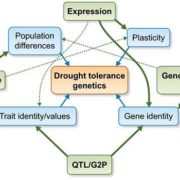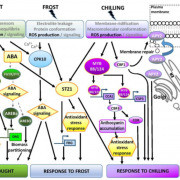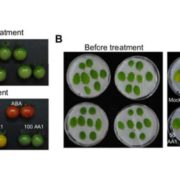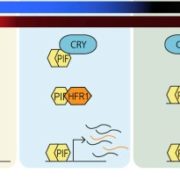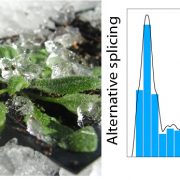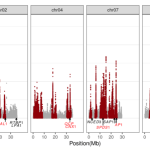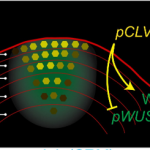Drought resistance or yield? In search of gold, we lost the diamond (Mol. Plant)
 Artificial selection has significantly increased crop yield. However, this has come at the cost of compromising abiotic stress tolerance. Stomatal aperture has an important role in abiotic stress tolerance. Abiotic stress induces stomatal closure and involves the intracellular production of reactive oxygen species (ROS) in guard cells. To unravel the underlying molecular modulators contributing to this tradeoff, a genome-wide association study was conducted recently by Gao et al. They reported that drought tolerance is conferred by a natural variant of ZmSRO1d, which encodes a mono-ADP-ribosyltransferase (SRO: SIMILAR TO RCD-ONE; rcd1 mutants are hypersensitive to ROS). The ZmSRO1d-R allele increases the activity of ZmRBOHC (an enzyme involved in ROS production), leading to the accumulation of ROS levels in guard cells and enhanced stomatal closure. Transgenic plants expressing the ZmSRO1d-R allele produce more grain under drought conditions, but show reduced yield under well-watered conditions, likely due to lowered rates of transpiration and gas exchange. Conversely, loss-of-function of ZmRBOHC led to increased stomatal aperture and increased grain yields under well-watered conditions, but severe drought sensitivity. Phylogenetic analysis revealed decreasing allele frequency of the drought-tolerance ZmSRO1d-R allele during maize domestication from its wild progenitor teosinte, providing clear genetic evidence that artificial selection for high yields may compromise crop stress resilience. (Summary by Rajarshi Sanyal, @rajarshi_sanyal. Mol. Plant 10.1016/j.molp.2022.08.009)
Artificial selection has significantly increased crop yield. However, this has come at the cost of compromising abiotic stress tolerance. Stomatal aperture has an important role in abiotic stress tolerance. Abiotic stress induces stomatal closure and involves the intracellular production of reactive oxygen species (ROS) in guard cells. To unravel the underlying molecular modulators contributing to this tradeoff, a genome-wide association study was conducted recently by Gao et al. They reported that drought tolerance is conferred by a natural variant of ZmSRO1d, which encodes a mono-ADP-ribosyltransferase (SRO: SIMILAR TO RCD-ONE; rcd1 mutants are hypersensitive to ROS). The ZmSRO1d-R allele increases the activity of ZmRBOHC (an enzyme involved in ROS production), leading to the accumulation of ROS levels in guard cells and enhanced stomatal closure. Transgenic plants expressing the ZmSRO1d-R allele produce more grain under drought conditions, but show reduced yield under well-watered conditions, likely due to lowered rates of transpiration and gas exchange. Conversely, loss-of-function of ZmRBOHC led to increased stomatal aperture and increased grain yields under well-watered conditions, but severe drought sensitivity. Phylogenetic analysis revealed decreasing allele frequency of the drought-tolerance ZmSRO1d-R allele during maize domestication from its wild progenitor teosinte, providing clear genetic evidence that artificial selection for high yields may compromise crop stress resilience. (Summary by Rajarshi Sanyal, @rajarshi_sanyal. Mol. Plant 10.1016/j.molp.2022.08.009)


